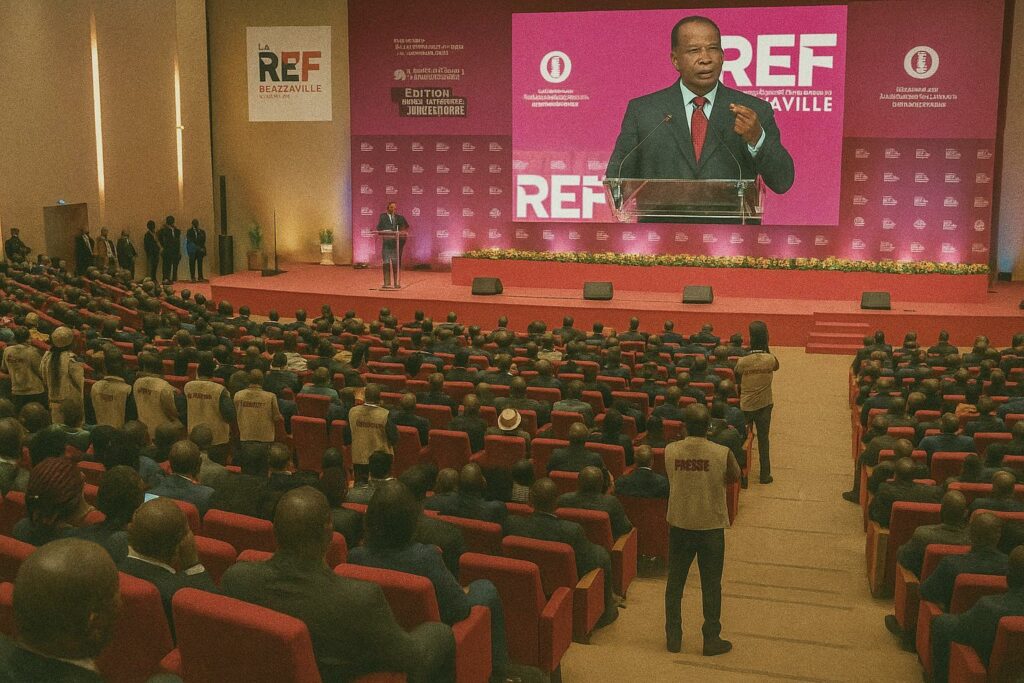Kintélé Emerges as Francophone Business Hub
For three days in late June 2025 the new conference complex on the banks of the Djiri River became the epicentre of Francophone economic diplomacy. More than one thousand delegates from some forty countries converged on Kintélé for the fifth Rencontre des entrepreneurs francophones, a gathering orchestrated by the Alliance des patronats francophones in partnership with the Congolese employers’ union, Unicongo. According to local organisers, the summit generated over a dozen memoranda of understanding worth an estimated 320 million dollars, although exact figures remain to be audited (Jeune Afrique, 2 July 2025). The choice of Kintélé, a satellite city twelve kilometres outside Brazzaville, underlines the government’s intention to position the area as both a logistical corridor and a symbol of modern infrastructure.
President Sassou-Nguesso Highlights Liberal Market Credentials
Opening the proceedings, President Denis Sassou-Nguesso framed the Republic of Congo as a “country of peace” committed to economic liberalism and the sanctity of private initiative. Citing recent revisions to the investment code, he argued that the fiscal environment is “increasingly incentive-based” and placed particular emphasis on agriculture, fisheries and minerals. Government data indicate that only 2 percent of the nation’s ten million hectares of arable land is currently exploited, a statistic presented as an opportunity rather than a weakness. External assessments lend some support: the African Development Bank’s 2024 outlook ranks Congo among the top five Central African states for reforms that simplify business registration. Still, international executives privately note that the true test will be speedy implementation of commercial courts announced last year.
Alliance des Patronats Francophones Seeks Mobility Reforms
Roberto Suárez Santos, chairing the Alliance, devoted much of his speech to a recurring concern: the restricted movement of entrepreneurs within the Francophone area. “Capital is increasingly intangible, yet executives still queue for paper visas,” he remarked, urging member governments to adopt mutual recognition schemes for business travellers. His point resonates with a recent International Chamber of Commerce briefing that classified mobility barriers as the single largest non-tariff cost in intra-Francophone trade, amounting to 4 percent of transaction value. Both Unicongo and the French MEDEF chapter have advocated a pilot e-visa between Brazzaville, Abidjan and Paris, but negotiations remain at a preliminary stage.
OIF Pushes Visa Facilitation to Unlock Trade Flows
Echoing the Alliance’s call, OIF Secretary-General Louise Mushikiwabo reminded delegates that economic Francophonie has been an institutional priority since the Yerevan summit of 2018. She praised Brazzaville for issuing more than 7 000 business visas in 2024—an 18 percent increase year-on-year—yet insisted that comparably agile procedures across the Francophone world are indispensable if trade volume is to reach the 250 billion-dollar target set for 2030 (OIF, 2025 communiqué). Diplomats from Canada and Senegal indicated that a joint working group would be convened in Montreal before year-end to draft uniform guidelines, suggesting that the Kintélé discussions carried tangible policy momentum.
Natural Resource Endowment Meets Green Transition
Beyond procedural matters, delegates scrutinised Congo’s comparative advantages. The country sits on an estimated 20 trillion cubic feet of natural gas—reserves that could feed both domestic power grids and export-oriented fertiliser plants. Simultaneously, Congo boasts Africa’s second-largest tropical forest expanse after the DRC, making carbon-credit schemes a promising frontier. A Bloomberg Green study published in 2024 estimated that verified forestry projects could generate up to 120 million dollars annually by 2030 if governance standards remain robust. Minister of Energy Didier Tongo emphasised during a side panel that Brazzaville aims to derive 30 percent of its electricity mix from renewables by 2035, a target he said would create “opportunities for joint ventures in hydro and solar.” Investors from Québec and Morocco signalled preliminary interest in partnering on a 200-megawatt solar park in the Niari basin.
From Signatures to Cambodia: The Road Ahead for the R.e.f
As the final plenary drew to a close, the Alliance bestowed its first “Excellence Award for the Promotion of Francophone Economy” on President Sassou-Nguesso, underscoring Brazzaville’s aspiration to play a convening role within the French-speaking world. However, organisers were quick to stress that accolades must translate into measurable outcomes. The sixth edition of the R.e.f, scheduled for Phnom Penh in 2026, will serve as an early barometer of follow-through on commitments signed in Kintélé. In the interim, the Congolese cabinet has pledged to fast-track the digital one-stop shop for investors and to table a public-private partnership law in Parliament by December. Whether those promises materialise will largely determine if the optimism that permeated the halls of Kintélé evolves into durable capital flows across the Francophone sphere.

